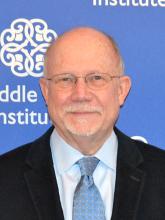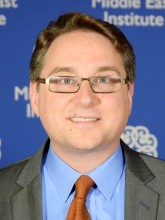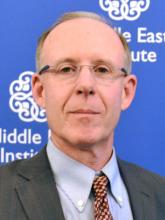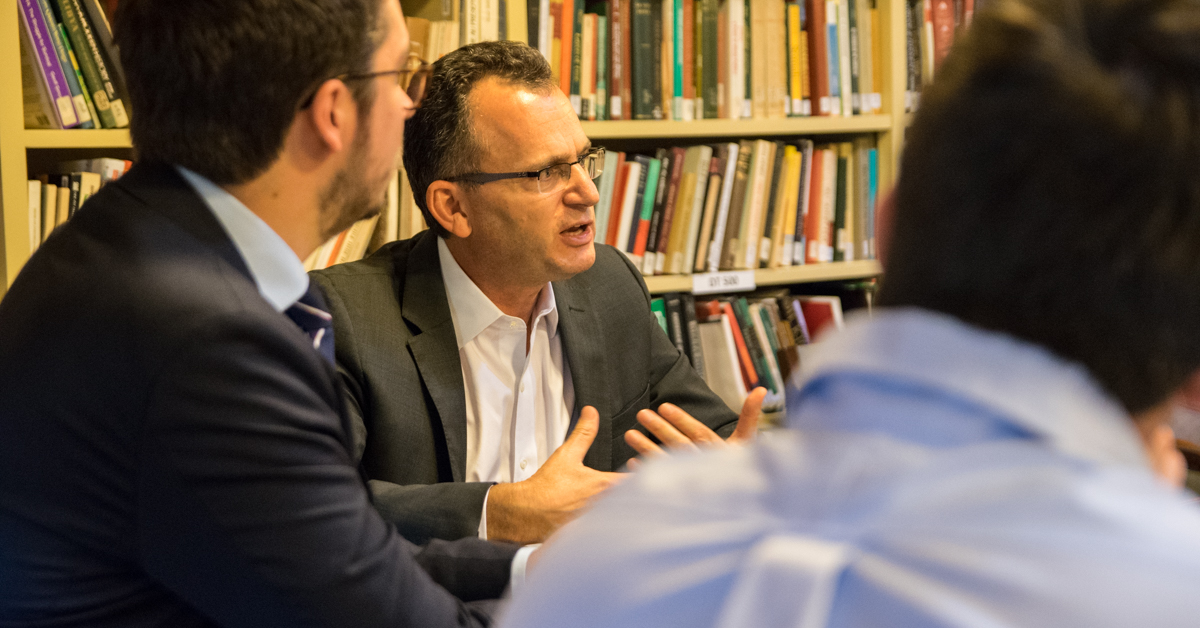
The Middle East Institute's Department of Languages and Regional Studies is pleased to announce a new regional studies course being offered for beginner to intermediate students of any age who wish to gain a better understanding of today's issues facing the Middle East.
Dates & Time
June 7th to July 26th
Thursdays, 6:30 PM to 8:00 PM
Course Description
This course will offer students an in depth look into the Middle East from the perspective of the worlds great powers and key global international institutions through weekly lectures and discussions led by MEI's renowned experts. Key issues will include the following: 1) An analysis of historical and future perspectives of the Middle East and the Global Order 2) Russian, Chinese, and European interests in the region. 3) The role of international and intergovernmental organizations such as the World Bank, IMF, UN, NATO, etc. This course will give students the opportunity to gain essential knowledge on the Middle East that can be used in future life experiences and career endeavors.
Tuition
$320
Contact Information
Middle East Institute
1319 18th Street NW
Washington DC 20036
languages@mei.edu
202-785-2710
COURSE LINEUP
Historical Perspective | The Middle East and the Global Order
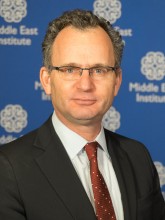
Paul Salem, Senior Vice President of Policy and Research Programs
Paul Salem focuses on issues of political change, transition, and conflict as well as the regional and international relations of the Middle East. He has a particular emphasis on the countries of the Levant and Egypt. Salem writes regularly in the Arab and Western press and has been published in numerous journals and newspapers. Salem is the author and editor of a number of books and reports including From Chaos to Cooperation: Toward Regional Order in the Middle East (ed. with Ross Harrison, 2017), Broken Orders: The Causes and Consequences of the Arab Uprisings (In Arabic, 2013), “The Recurring Rise and Fall of Political Islam” (CSIS, 2015), “The Middle East in 2015 and Beyond: Trends and Drivers” (MEI 2014), Bitter Legacy: Ideology and Politics in the Arab World (1994), Conflict Resolution in the Arab World (ed., 1997). Prior to joining MEI, Salem was the founding director of the Carnegie Middle East Center in Beirut, Lebanon between 2006 and 2013. From 1999 to 2006, he was director of the Fares Foundation and in 1989-1999 founded and directed the Lebanese Center for Policy Studies, Lebanon's leading public policy think tank.
The Trump Doctrine | US Interests in a Volatile Region
Allen Keiswetter, Scholar
Allen Keiswetter, a retired Senior Foreign Service Officer, is a Scholar at the Middle East Institute, Senior Consultant at C&O Resources and an Adjunct Professor at the University of Maryland. He has taught courses on Islam and on the Middle East at the National War College and the National Defense Intelligence College. He served as the Senior Advisor on the Middle East to the US Delegation to the General Assembly.
In his 36 years at the Department of State, he was Deputy Assistant Secretary of State for Near Eastern Affairs, Director of Arabian Peninsula Affairs in the Near East Bureau and Director of the Office of Intelligence Liaison in the Bureau of Intelligence and Research. He also served as NATO Deputy Assistant Secretary General for Political Affairs in Brussels.
While Director of Regional Affairs in the Near East Bureau, he chaired the Middle East Peace Process Multilateral Working Group on Water Resources. Previously, he held posts as Political Counselor in the US Embassy in Riyadh, Saudi Arabia, and Deputy Chief of Mission at the US Embassy in Sana’a, Yemen. He also served at the US Embassies in Tunis, Khartoum, Baghdad, and Beirut.
US Security and Counterterrorism Strategy
William Wechsler, Senior Fellow on National Security and Counterterrorism
Prior to joining the MEI as adjunct scholar in 2008, Dr. Zubair Iqbal worked with the International Monetary Fund (IMF) for 35 years, retiring in 2007 as Assistant Director of the Middle East and Central Asia Department. Before joining the IMF, Iqbal worked as Senior Research Fellow, Department of Economics, Islamabad University, Islamabad, Pakistan.
At the IMF, Iqbal held multiple postings ranging from those for the development of macroeconomic and exchange and trade policies for adjustment and growth in member countries, strategies for IMF-member country relations, design of adjustment programs for the balance of payments assistance and technical support. During the period, Iqbal participated in missions to 54 countries in Africa, Asia, the Middle East, Europe, and Latin America. During the last two decades, the primary focus was on the Middle Eastern and Central Asian countries, including as mission leader to 16 countries, both oil producers and oil importers. He also served as senior advisor to the Saudi Arabian Executive Director to the IMF. In addition to operational work, Iqbal conducted and guided research in trade policy issues, role and effectiveness of foreign aid, external debt, Islamic banking and finance, regional integration (primarily in the Middle East), and transition from oil dependence to more diversified economies. In the process, he wrote or edited 5 books and over forty articles in the IMF and external research publications.
While at the MEI, Iqbal has coordinated discussions of the Working Group on Pakistan’s economy and has been writing notes and articles on regional developments, including Pakistan’s economic challenges, factors underlying the democratic movement in the Arab world, and outlook for the future. In addition, he has been commenting on the regional developments on the Voice of America, BBC, and Bloomberg, besides national and international newspapers.
The Strategic Seam Between Europe and the Middle East
Russia’s Strategy and Policy | Ambitions, Tools, and Methods
Ronda Slim, Director of Conflict Resolution and Track II Dialogues Program
Randa Slim is Director of Conflict Resolution and Track II Dialogues Program at the Middle East Institute and a non-resident fellow at the Johns Hopkins University School of Advanced and International Studies (SAIS) Foreign Policy Institute. A former vice president of the International Institute for Sustained Dialogue, Slim has been a senior program advisor at the Rockefeller Brothers Fund, a guest scholar at the United States Institute of Peace, a program director at Resolve, Inc, and a program officer at the Kettering Foundation. A long-term practitioner of Track II dialogue and peace-building processes in the Middle East and Central Asia, she is the author of several studies, book chapters, and articles on conflict management, post-conflict peace-building, and Middle East politics.
China’s New Grand Strategy | Present and Future

Dr. John Calabrese, Director Middle East-Asia Project
Dr. John Calabrese teaches US foreign policy at American University in Washington, DC. He also serves as a Scholar in Residence at the Middle East Institute where he is directing MEI's project on The Middle East and Asia (MAP). He is the Book Review Editor of The Middle East Journal and previously served as General Series Editor of MEI Viewpoints. He is the author of China's Changing Relations with the Middle East and Revolutionary Horizons: Iran's Regional Foreign Policy. He has edited several books and has written numerous articles on the international relations of the Middle East, especially on the cross-regional ties between the Middle East and Asia. He co-directed the MEI-FRS project for the European Commission on Transatlantic Cooperation on Protracted Displacement.
International and Intergovernmental Organizations
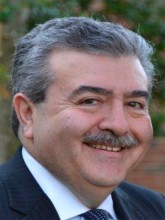
Shahrokh Fardoust, Scholar
Shahrokh Fardoust is a research professor at the Institute of the Theory and Practice of International Relations at the College of William and Mary. He has more than 30 years’ experience in crafting economic development policy and analyzing the global economy and prospects. From 2008 to 2011, he was director of strategy and operations for development economics at the World Bank, where he contributed to the research and policy priorities of the chief economist and ensured the operational relevance of the Bank's research.
His previous senior positions at the World Bank included senior adviser to the director-general of the Independent Evaluation Group and senior economic adviser to the senior vice president and chief economist. Dr. Fardoust also served in various technical and operational positions at the World Bank. He was a member of the core team for the World Development Report, a senior economist for Egypt, a lead economist for Pakistan, and an economic advisor on India, where he lead a team of experts responsible for economic policy dialogue and reforms at the national and subnational levels.
Before joining the World Bank, he was a senior economist at the United Nations Secretariat in New York, a visiting lecturer in economics at the Wharton School, and a postdoctoral fellow and lecturer in the economics department at the University of Pennsylvania, where he led Project LINK’s work on medium- and long- term global economic scenarios.
Dr. Fardoust specialized in economic development, international trade and finance, and economics. He has authored numerous papers and reports on development policy, economic analysis, and long-term forecasting; subnational fiscal policy; aid effectiveness; poverty and income distribution, and macroeconomic implications of sovereign wealth funds.
He is a co-editor of and contributor to Post Crisis Growth and Development: A Development Agenda for the G20 (World Bank, 2011) and Towards a Better Global Economy: Policy Implications for Global Citizens Worldwide in the 21st Century (Oxford University Press, 2014, 2016 paperback edition). He is also a member of the SovereigNET Advisory Council at the Fletcher School at Tufts University, and a member of the Expert Advisers group for the European Investment Bank-Global Development Network project.
Future Perspective: The Middle East and the Global Order
Ross Harrison, Senior Fellow
Ross Harrison is a scholar at The Middle East Institute and is on the faculty of the School of Foreign Service at Georgetown University. From 2007-2013, he was professor in the practice of international affairs at Georgetown, serving as chair of the international commerce and business concentration in the Master of Science in Foreign Service (MSFS) program. He annually teaches a course on strategy and international security to senior Georgian government officials at the Georgian Foundation for Strategic and International Studies in Tbilisi, Georgia, funded by the U.S. Department of State. Harrison authored Strategic Thinking in 3D: A Guide for National Security, Foreign Policy and Business Professionals (Potomac Books, 2013), which currently is a required strategy text at the U.S. National War College. Related to the book release, he has lectured at the U.S. Department of State, the National War College and National Defense University, Georgetown University, and the Matthew B. Ridgway Center for International Security Studies. He has also been published in policy-related outlets such as The National Interest, Al Monitor, The Middle East Journal, and Parameters (the U.S. Army War College Journal).
*Instructor line up subject to change













